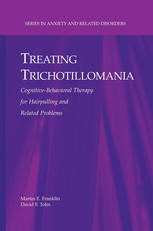

Most ebook files are in PDF format, so you can easily read them using various software such as Foxit Reader or directly on the Google Chrome browser.
Some ebook files are released by publishers in other formats such as .awz, .mobi, .epub, .fb2, etc. You may need to install specific software to read these formats on mobile/PC, such as Calibre.
Please read the tutorial at this link: https://ebookbell.com/faq
We offer FREE conversion to the popular formats you request; however, this may take some time. Therefore, right after payment, please email us, and we will try to provide the service as quickly as possible.
For some exceptional file formats or broken links (if any), please refrain from opening any disputes. Instead, email us first, and we will try to assist within a maximum of 6 hours.
EbookBell Team

4.1
50 reviewsTrichotillomania has been described in the literature for at least a hundred years, but has only in the past decade received serious clinical attention. Although now a "higher profile" disorder, there is still scant clinical information on trichotillomania. A full-length cognitive-behavioral treatment manual, Treating Trichotillomania (TTM) fills that need. Designing the book for maximum usefulness, authors Franklin and Tolin share their considerable expertise in treating body-focused repetitive behavior disorders (not only hair-pulling but skin-picking and nail-biting as well) in an accessible, clinically valid reference.
Treating Trichotillomania carefully defines TTM, differentiating the disorder from other conditions such as OCD, reviewing the varied clinical forms it can take, and setting out its diagnostic criteria. Treatment chapters are not one-size-fits-all, but offer an evidence-based framework to help practitioners in designing the most appropriate course of treatment across the developmental spectrum, from toddlers to elders. The authors give the reader:
With the increasing recognition of body-focused repetitive behavior disorders and their negative impact upon the lives of sufferers, the clinical psychologist, psychiatrist, social worker, counselor, or school practitioner needs the broadest understanding of the problem, which can be found in this reader-friendly volume.